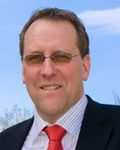Plenary Talks 3
THz Communications – A candidate for the next Generation of Wireless Systems?
About the presenter

- Presenter
- Thomas Kürner
- Affiliation
- Technische Universität Braunschweig
Thomas Kürner (Fellow IEEE) received his Dipl.-Ing. degree in Electrical Engineering in 1990, and his Dr.-Ing. degree in 1993, both from University of Karlsruhe (Germany). From 1990 to 1994 he was with the Institut für Höchstfrequenztechnik und Elektronik (IHE) at the University of Karlsruhe working on wave propagation modelling, radio channel characterisation and radio network planning. From 1994 to 2003, he was with the radio network planning department at the headquarters of the GSM 1800 and UMTS operator E-Plus Mobilfunk GmbH & Co KG, Düsseldorf, where he was team manager radio network planning support responsible for radio network planning tools, algorithms, processes and parameters from 1999 to 2003. Since 2003 he is Full University Professor for Mobile Radio Systems at the Technische Universität Braunschweig. In 2012 he was a guest lecturer at Dublin City University within the Telecommunications Graduate Initiative in Ireland. Currently he is chairing the IEEE 802.15 Standing Committee THz. He was also the chair of IEEE 802.15.3d TG 100G, which developed the worldwide first wireless communications standard operating at 300 GHz. He is also the project coordinator of the H2020-EU-Japan project ThoR (“TeraHertz end-to-end wireless systems supporting ultra-high data Rate applications”) and Coordinator if the German DFG-Research Unit FOR 2863 Meteracom (“Metrology for THz Communications”). In 2019 he received the Neal-Shephard Award of the IEEE Vehicular Technology Society (VTS). Since 2016 he is a member of the Board of Directors of the European Association on Antennas and Propagation (EurAAP) and since 2020 a Distinguished Lecturer of IEEE Vehicular Technology Society..
Abstract
Already a couple of years ago THz communications have not only become an attractive new research area on channel modeling but also triggered a couple of projects heading to develop appropriate technological solutions to enable the set-up of hardware demonstrators. In parallel discussions and activities in standardization and regulation already took off. In October 2017, IEEE published Std. IEEE 802.15.3d-2017 the worldwide first wireless communications standard operating in the 300 GHz frequency band. Regulatory activities w.r.t. the World Radio Conference 2019 (WRC-2019) via a dedicated agenda item have taken off yielding in the identification 160 GHz of spectrum for THz communications. The harsh propagation conditions with the high path loss, which need to be mitigated by high gain antennas and the small wave length making even small-size objects relevant to model the propagation channel brings new challenges and interesting research questions to the antennas and propagation community The speaker has been actively involved in all those areas. The talk will provide a brief overview on the current status of the development of THz Communication systems focusing on the past and current activities at IEEE 802, the regulatory situation and scientific advances. Recent results on advanced channel characterization at 300 GHz, requirements for the development of antennas, hardware demonstrators operating in this frequency range and challenges on metrology for THz communications will be presented mainly based on research projects the speakers is participating.

